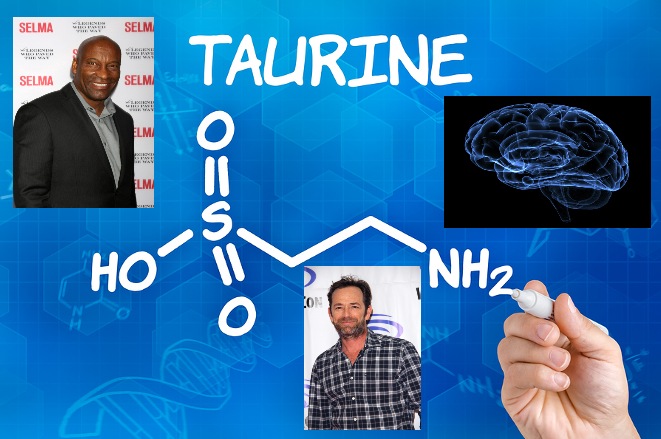Recently I stumbled across an article that talked about taurine and brain health, especially as it applies to protecting brain cells from further destruction after a stroke.
As many film buffs know, two famous people in the movie industry recently died from a stroke. One was the actor Luke Perry. The other is the director John Singleton. Luke Perry was 52. John Singleton was 51.
Could they have benefited from taurine?
I don’t know.
But I recently did an article on taurine and its ability to eliminate certain types of heart arrhythmia. So it’s worth looking at the research on taurine and brain health to see if this conditional amino acid can be helpful in age-related cognitive concerns.
Taurine and Brain Health – The Basics
Taurine is an amino acid. Your body needs 20 different amino acids to maintain optimal health. And while all 20 are important, only nine of them are classified as essential. They are:
Histidine, Isoleucine, Leucine, Lysine, Methionine, Phenylalanine, Threonine, Tryptophan, and Valine.
These are classified as essential because your body can’t make them. They must come from your diet.
Taurine is not an essential amino acid because your body can make its own. But only in small amounts.
If your diet is rich in meat, fish, and dairy, then you most likely get enough of this amino acid to meet normal needs. However, as we age our taurine levels decline, especially its concentration in the brain.
Taurine helps your mitochondria, the “power plants” of every cell, function optimally in their production of cellular energy. It’s most abundant in your muscles, heart, eyes, and brain. Which would make sense since these organs need a great deal of energy to function properly.
Taurine and Brain Health – The Specifics
Taurine is a key amino acid in helping to protect, maintain, and optimize brain health. Let me first give you an overview and then we’ll specifically highlight 3 key elements of taurine and brain health:
Taurine helps to stimulate new brain cell growth.
Taurine helps to protect against a condition called excitotoxicity, which is harmful overactivity in the brain.
Taurine minimizes brain damage caused by head injuries and strokes.
Taurine protects your brain cells against environmental toxins like lead and organic pesticides.
Taurine helps maintain normal mitochondrial function within the brain to help sustain energy levels.
Taurine synergistically works with other neurotransmitters to help form memories and aid in retaining information.
Taurine helps to reduce brain inflammation especially in key brain health concerns like Alzheimer’s and Parkinson’s diseases.
Taurine helps to protect against damage caused by beta amyloid protein, which is a major contributing factor in the progression of Alzheimer’s disease.
That’s an impressive list of health benefits to the brain. And I would like to focus on three key items from the above list.
Taurine and Brain Health – Neurogenesis
For a long time it was assumed that once a person was fully grown they stopped producing new brain cells. That is no longer true.
Recent research shows that adults at any age have the capacity to create new brain cells. This process is called neurogenesis. And it’s a key element in preserving a healthy brain as you age.
Multiple animal and cellular studies on the use of taurine have demonstrated how this amino acid helps to activate brain stem cells, stimulate new brain cell production, and then is key in supporting their survival.
Taurine and Brain Health – Alzheimer’s Disease
One of the major contributing factors to Alzheimer’s disease is the toxic effects of beta-amyloid formation and the resulting inflammation associated with it.
In a resent study published in Neuropharmacology, taurine was shown to protect rat brain cells from the toxicity associated with beta-amyloid production. It seems that taurine can directly bind to the beta-amyloid protein to reduce its impact on cognitive function.
Additionally, taurine helped to protect brain function, reduce brain inflammation, protect against oxidative stress, and boost neurotransmission all leading to improved cognitive function.
Taurine and Brain Health – Diminishing Stroke Impact
Every year more that 795,000 people in the United States have a stroke. For those that do not die, the vast majority of them live the rest of their lives disabled, which impacts them and their loved ones.
Most of these strokes are due to an ischemic stroke were blood flow is reduced or blocked to a part of the brain because of a blood clot.
In animal models of ischemic stroke conditions, supplementing with taurine deceased the volume of brain damage by about 55% compared to animals that didn’t receive treatment.
Taurine’s ability to reduce oxidative stress and improve energy production were helpful in reducing the damage. As well as aiding in the healing process.
And the use of taurine also reduced brain swelling.
As I shared earlier you can get the amino acid taurine from your diet. However, if you’re like most Americans your diet is heavy in carbohydrate intake and low in protein consumption.
This means that supplementation can be a good option for increasing your intake of this amino acid. It is low cost and most good capsule formations will have 1,000 mg per serving.
One note of caution. Taurine is usually added to most energy drinks. I would highly recommend that you not use energy drinks to get your daily intake of taurine because the anhydrous caffeine and sugar used in these drinks create more health problems than benefits.
For additional information on taurine and brain health, please click here.
Blessing Lives Through Nitric Oxide Therapy!
Dan Hammer

Leave a Reply
You must be logged in to post a comment.